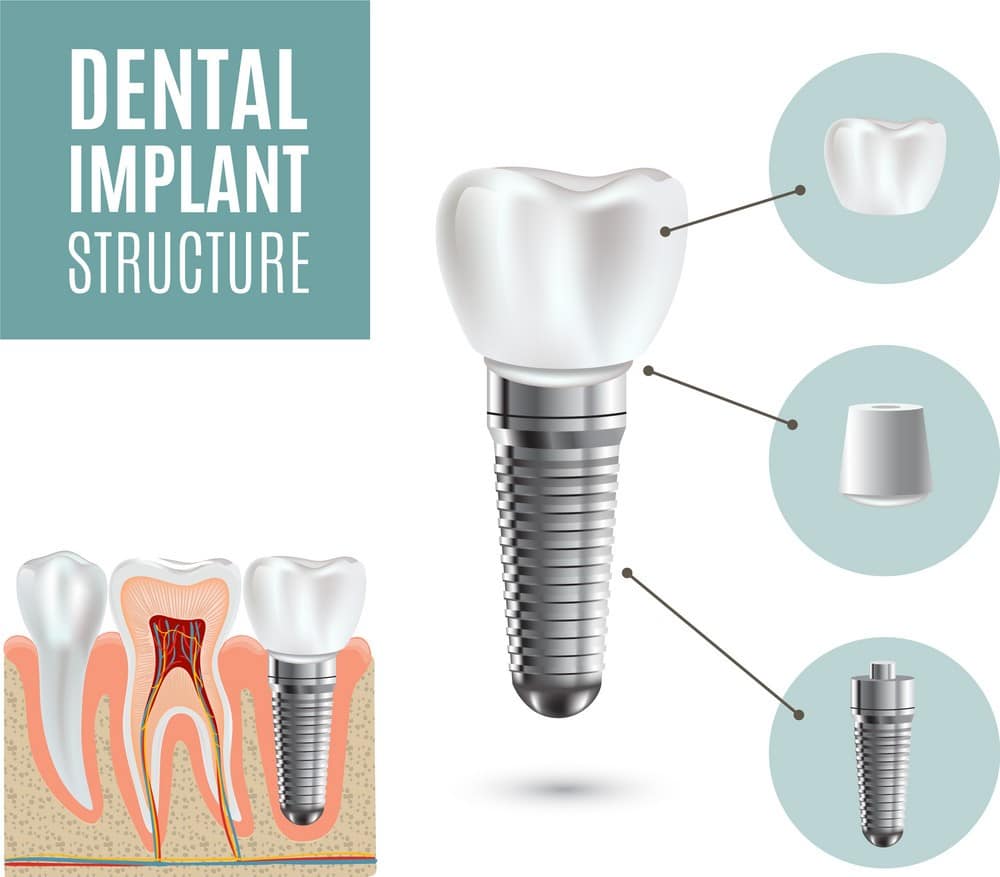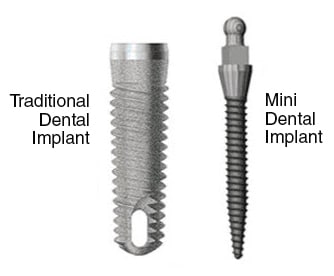So I have to tell you, the first question most patients google when they are considering dental implants is “What is a Dental Implant?“. And yes, you guessed it, the second question googled by patients is “How Much Do Dental Implants Cost?”
For this article I want to really dive in to how much dental implants cost, what you can expect, any tips and tricks for making payment easier, and everything you need to know about making dental implants a solid value long term.
Let’s Get Right To It: The Cost of Dental Implants
If you know anything about my writing as a healthcare journalist, you know I like to tease and lead my way into topics. Not for this one. Why beat around the bush when you clearly want cold hard facts. So for those of you who want straight numbers, I’ll give you the goods first. Then we can discuss why the numbers are more than just dollars and cents. So here we go.
If you’ve checked out my other blog post, “How long do Dental Implants Last?” you know that dental implants are three components. The three components are the implant in the bone, the abutment, and the restoration. Therefore, you have to understand that the cost of an implant is also three parts. To make it simple let’s look at each individually:

- The Implant: This is the post that simulates the root of a natural tooth. The procedure is placed surgically either at the time of an extraction or after a period of time after the extraction heals. You can expect anywhere from $1500 to $3000 as an average cost for this procedure.
- The Abutment: This is the connector that connects the implant that is in the bone to the restoration that the patient chews with. You can expect an average cost of $800 to $1200 for an abutment.
- The Restoration: Restoring a dental implant is where the beauty comes in both figuratively, literally, and financially. An implant can be restored with a single porcelain crown, a bridge, a partial denture, or a full denture. Just like Legos there are many combinations possible. However, when most people think of dental implants they are thinking of a single implant with a crown restoration. The crown restoration will cost an average of $1200 to $2500.
And yes, I know there are some pretty large ranges above. That’s because the costs are variable depending on where you are located in the country. Bear in mind if you are in a rural area you will trend toward the lower range, and if you are in the downtown of a major city it will range toward the higher end. There are of course some outliers above or below these ranges, but the ranges will give you a sense of what is most common.
The fees also will vary based on experience of the professional and if you are having your procedure done at a boutique VIP type practice or at a more volume based practice that runs promotions.
What if I Need a Bone Graft. How Much Does Bone Grafting Cost?
As you probably understand by now, a dental implant is supported by bone. There needs to be sufficient bone height and width for success. Bone can be insufficient because of two reasons:
1) Bone may have had to be removed to allow a tooth to be extracted
2) The bone may have decreased over time if the tooth was missing for prolonged time. This process is known as disuse atrophy.
Bone grafting is a common part of the dental implant process. In this procedure, doctors work to gather healthy bone from another area of your body, or use cadaver or animal donors, to implant into the jawbone. Your body will take the minerals of the bone graft and integrate it seamlessly with your existing jawbone. The bone site will therefore be stronger and healthier to support the future implant.
The cost of bone grafting can vary based on the extent of bone required. The cost for bone grafting prior to a dental implant is $300 to $800 per tooth or implant area for using the most common type of bone which is an allograft from a donor bone bank.
How Much Are Mini Dental Implants?
Many patients ask us about mini dental implants because the cost is less than traditional implants. The reality is, yes mini implants do cost less, but they have lower success rate than traditional implants. If a patient is going to invest in treatment with low chance of success solely due to economics it is our professional advice to recommend other alternatives that may be available with higher success rate. But of course, since you asked, the cost of mini dental implants at most offices range from $500 to $1,500.

How Much Does It Cost to Get Full Mouth of Dental Implants?
When we develop a treatment plan to restore an entire mouth with dental implants it often can include a spectrum of different options. The cost will range based on the extensiveness of the work to be done. When you need multiple teeth implants, the cost will range from $25,000 – $90,000 and up depending on how many teeth are involved, as well as, bone grafting, dental extractions, temporary restorations.
Does Insurance Cover Dental Implants?

The short answer is usually- Yes. Most insurances will provide benefits toward the implant placement procedure, the abutment, and the crown.
Although, I must say that there are limitations to the coverage. Most dental insurances have a yearly maximum which is somewhere in the range of $1500 to $3000 in benefits per year. Since the entire dental implant procedure costs more than the maximum, the remaining cost will be passed on to the patient. Hint: check out tip #1 in the last section of this article to learn how to make the most of your annual maximums.
You will need to understand if the implant specialist is in-network or out-of-network. Here’s the thing: the network has nothing to do with experience or how good the implant specialist is, but rather, if they are willing to negotiate their fees for the insurance. There will be different fees depending if you select a dentist in-network or out-of-network.
How Much Does Insurance Pay for Dental Implants?
The amount of insurance coverage depends on your policy. The most common structure is for dental insurance to provide 50% coverage for implants and crowns. Some policies may cover the full cost but this is rare. Please ask your dentist or consult with your dental insurance provider.
What’s the Best Way to Afford Dental Implants?
I’m going to give you my biggest tips that help patients afford dental implants, but first I want to give a word of caution about decision making in healthcare: Don’t let sticker-shock prevent you from choosing the best long term decision.
Let’s think of it this way: Consider dental implants like a kitchen remodel. Both allow you many decades of laughter, uninhibited chatting, and enjoyment of wonderful meals. Just like a kitchen remodel there’s a large upfront investment, but that investment is something you do correctly only once, and you can reap the benefits for many decades to follow.
Dental implants are the same. They are an investment in your future. Once you complete a dental implant, it generally has low maintenance required for the following decades.
Top Tips to Comfortably Afford and Invest in Dental Implants
And now you have it. After discussing all those cold hard numbers, let’s talk about the tips that can help ease the financial burden. After all, the goal of treatment is to provide you with a beautiful smile that you can be proud of and chew comfortably with. Here’s my top tips for making the process of implant dentistry easier and more affordable.
-
Pace the Treatment:
The beauty of dental implants being three components is that treatment often needs to be staged in phases. The implant is placed in the bone first and that must heal for 3-6 months. This time can be hugely valuable in helping you to space out your finances. It also can be used to conveniently space treatment into a new insurance year to maximize your annual limits.
-
Go hybrid:
No I don’t mean lower your carbon foot print by driving a Toyota Prius, although there’s nothing wrong with that either. What I mean is consider leveraging various options. We talked about how with implants you have numerous choices. Here’s the thing, if you are missing several teeth you don’t need to restore them 1 for 1. You can choose a denture to attach to the implants. Because a denture is billed as one unit, either top or bottom, you can restore several teeth as a unit. For patients missing three or more teeth this can create major savings.
-
Don’t Procrastinate:
The first 1-2 years after a tooth is lost is the ideal time to have a dental implant placed. As time continues, the bone where the tooth was begins to recede in height and width. By delaying treatment, additional procedures may be needed to restore the missing bone such as bone grafting and sinus procedures. I get it, it is a big investment now, but it can be an even bigger investment if you decide to wait.
-
Utilize Financing:
Just like other big investments are financed, medical care is no different. No realtor would expect you to invest in a home without offering the option of financing. Complex medical care and dental care is the same way. Look into financing programs like Care Credit, Lending Club, and HELOC to help provide leverage to make the investment easier.
-
Let Uncle Sam do the Heavy Lifting:
You know that HSA (health savings account) and FSA (flexible spending account) your employer established for you? They provide powerful benefits that can be used for implant dentistry. I recommend using these accounts for any cost not financed or covered by insurance. When you pay with money from your HSA or FSA, you reduce your income tax obligation, essentially getting a 15-38% discount depending on your tax bracket.
-
Don’t Forget about Medical Insurance:
Yes, that’s right, I said medical insurance…not dental insurance. We talked about how dental insurance covers a portion of dental implants, but don’t forget to check with your medical insurance. There may be medical insurance benefits as well for dental implant surgery. Depending on your particular medical insurance and why you need the dental implants, you may be able to tap payment from medical insurance in addition to your dental insurance.
Bonus Tip: The Grass isn’t Greener
In business, there’s a concept called lifetime value. Let me leave you with this fun thought. Arnold Schwarzenegger was in dozens of movies. When you think Arnold’s successful movies you probably think of one of the Terminator movies. By far those were his biggest box office hits.
But nope, financially he made less on all those movies compared to one unsuspecting movie– Twins. And here’s why it matters. For all of his movies Arnold was paid a large salary upfront—except for Twins. For that movie, he decided to forgo any salary upfront. Instead he negotiated a large percentage of the backend profits. Although he made a large investment of his time upfront, he benefited many times over for the following decades from the royalties of that single movie. The point is–the long term benefits can be much greater than an upfront investment.
So when you are deciding on medical treatment, the key is to think long term. The upfront cost is a factor, yes, but the benefits are much greater over time. A dental implant may be more cost initially. However, when you factor in your quality of life, your long term benefits may be more advantageous compared to the alternatives.


